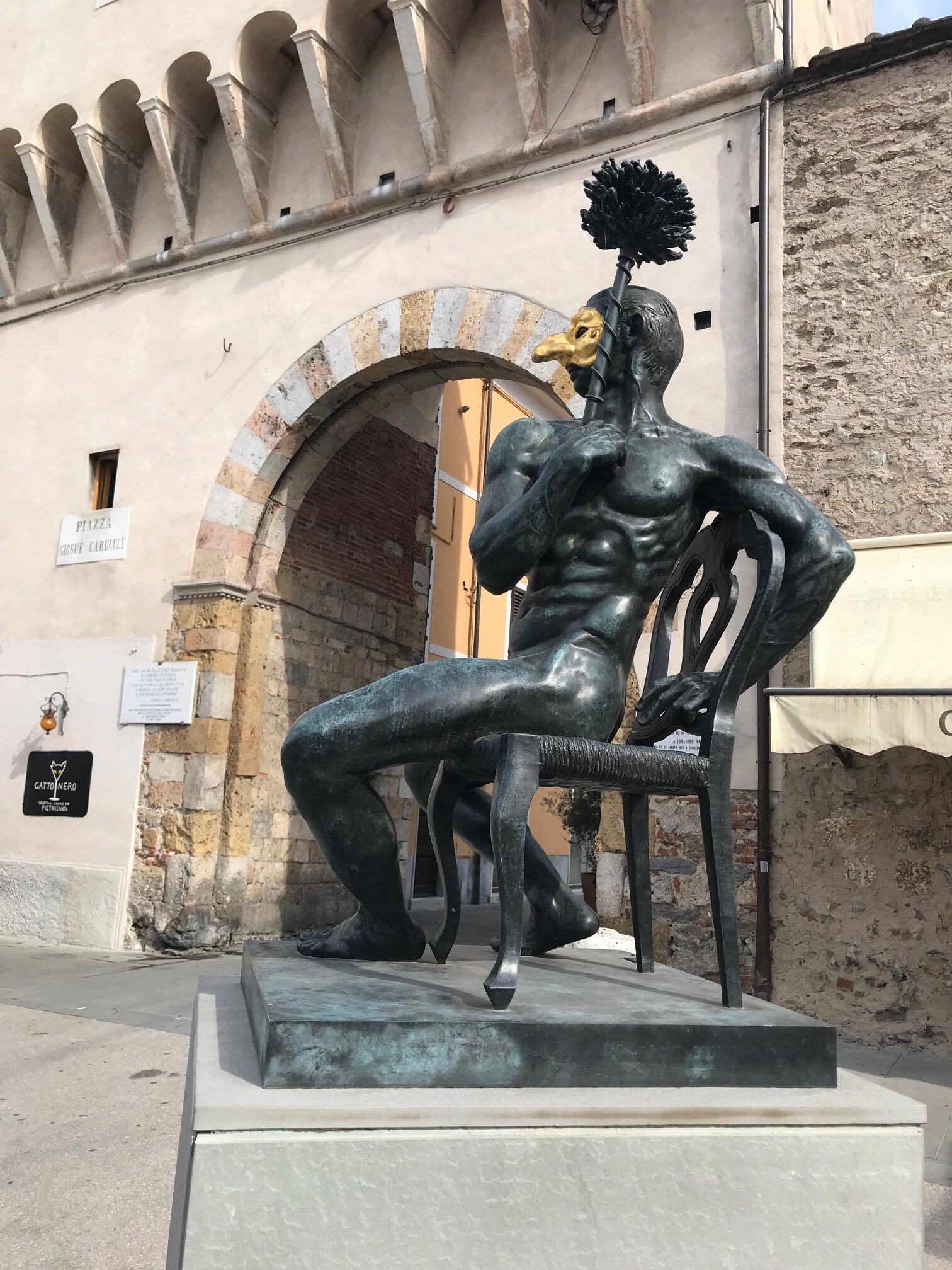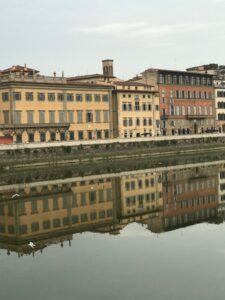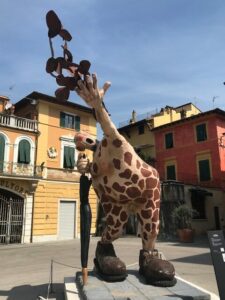
Life Through My Eyes in Florence
Learning how to row is on my bucket list, and I noticed that there was a rowing club in Florence. I went to explore. Once again, a huge iron door separated the world from the inside destination. I rang the bell, and the door was released. I descended into the Societa Cantottieri “Firenze”’s –the city’s rowing club. I entered the main office and stood on the other side of the counter from the rowing club administrator and meekly said:
“I speak English. Do you speak English?”
“No. No English.” I was ready to retreat but she then proceeded to talk at full speed in Italian. It always seems like full speed to me; perhaps it’s not. But Italians appear to not pause or breathe when they are talking.
Instead of stopping her, which did not appear to be an option, I nodded in agreement and occasionally echoed what appeared to be an important word. I privately thought my behavior was ludicrous and questioned why I was nodding and repeating words that I did not even understand. My behavior only encouraged her to continue. After about ten minutes I forgave myself, acknowledging that the Italians had a way of pulling you into the moment even if you are clueless about what the moment is about. But forgiveness soon turned into self-blame, and I asked myself why I was acting as if I understood. I really do not understand a single word of Italian. We continued for about 20 minutes. Me nodding and her explaining what appeared to be information about the club, I learned it was a club when she wrote down the cost. I thought it was a public club and would cost something like 25 euros a day, but it was private and cost a lot more. Then there was the medical certificate issue. To participate in any club activities or to join exercise or sports clubs in Italy you must have a medical certificate. I had learned this the previous day, in English, from a sports club I walked into.
The woman paused when she presented the medical papers, looked at me and with exasperation said the word ‘doctors’ in English. She then pointed to my eyes and shook her head ‘No’, I assume she meant to clarify we were not talking about opticians. She leaned forward and pulled my ear, shook her head and said no. We are not talking about ear/nose and throat doctors. She then imitated the action of rowing and together we shook our heads in the yes motion and she smiled with joy and wrote a couple of names down, whom I presumed specialized in rowing health requirements. A sports doctor. I nodded, took the papers and departed.
I decided to retreat to speaking English the rest of the day, and that evening I attended a lecture at the British Institute. Hidden behind another heavy iron door, the British institute took pride in the fact that it offered an extensive library to promote an intellectual exchange between England and Italy, created 100 years ago. The library had shelves of books from the floor to the ceiling covering every wall of the room. The dust had settled on many of the books, untouched for decades.
The setting evokes the images of the British in India and Kenya. Some of the elder men are dressed in tweed suits, and you can sip tea in the afternoon. Since the 1850s when Victorians could travel from London to Florence by steam train in 36 hours, the habit of the British vacationing and living in Italy has existed.
Every Wednesday evening there is a lecture in the institute’s library followed by wine and a social hour. The social begins with grumbling about the awful lecture or praising the speaker. Today they grumbled that the lecture titled: ‘A Beautiful Darkness: Rivalry, Competition, and Madness in Renaissance Florence,’ didn’t have enough scandalous details.
I began speaking with a tall elegant elderly British woman who lived in Florence from May until mid-November and then in Chang Mai in Thailand from Mid-November to May. She commented:
“I love both cities and can’t decide which one to live in, so I live in both.”
As she turned to leave, I noticed that where her short-cropped gray hair ended, just above the top of her neck, she had long hair tattooed over the back of her neck and shoulders. It was the most beautiful, sensuous tattoo I had ever seen. She was, for me, a role model for aging.
I then joined a group of women I had met the previous day on a British Institute wine-tasting and lunch outing in the hills above Florence. One woman had brought her dog on the outing and the dog’s adventure with two donkeys and a baby alpaca was the topic of the conversation.
“The donkeys were so ferocious when the dog ran into their field,” commented one woman.
“Frightful, frightful. That alpaca was a naughty animal.”
I didn’t comment but just thought to myself that I didn’t think it was ‘naughty.’ I just thought it was outright strange. It was a baby alpaca shaved like a French poodle.
The women in the group had lived in Italy for many years. They were very skilled at practicing the Italian art of pulling the other person into the conversation, and as a newcomer, I felt very comfortable and a part of the group
The following day I went on a hike and lunch outing organized by the local English-speaking newspaper. The lunch took place on a hillside at a winery. Although the food was delicious it was hard to relax as the table was perched slightly downhill. I found myself tightening my toes into the soil, fearing that the whole table was going to slide. The woman on my right knocked her beer bottle over and it had a domino effect with three other bottles next to it, a clear indication that the table was not stable. What could happen to us if one of us lost our balance? Following the rolling bottles the woman on my left turned to me and said, without an introduction:
“I don’t know what I’m doing. I recently retired and we sold our home and bought a townhouse in North Carolina near the kids, and I have no idea who I am or what I am doing. We came to Italy and I don’t know why. You know what I mean?”
I smiled and thought to myself that I was also lost at this transition point in life. The longer I stay out, the more distant I am from routine, from familiarity. When she said – ‘You know what I mean?’ I knew exactly. I often say to people that I want my writing to be about this stage in women’s lives. The letting go of a career that defines us, children who no longer need us daily. A point when we loosen the reins of what defined us and give ourselves the power of redefining ourselves.




